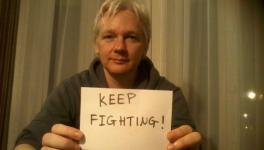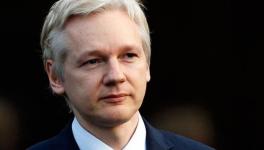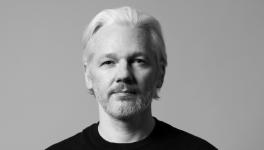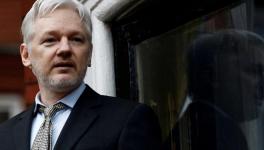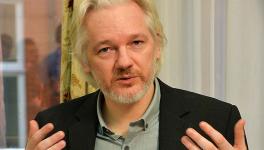'Nothing surprising about the Wikileaks cables on Indo-US Defence Framework'
Newsclick Analyst D.Raghunandan comments on the Wikileaks' cables on the Indo-US Defence Framework Agreement, accessed by The Hindu newspaper. He says there is nothing surprising about the content of the cables, which clearly suggest how the US is trying to get India into a closer strategic and defence partnership, notwithstanding pressures from the Indian military and civilian bureaucracies to resist a total bandwagoning.
Prabir Purkayastha (PP) - Hello and welcome to Newsclick. Today we have with us, D. Raghunandan, who has been following up the issue of defense policy and Wikileaks. Raghu,a lot of the arguments that came from the left, which was originally thought to be a part of the left's conspiracy theory, seems to have been borne out by Wikileaks.
D. Raghunandan (DR) - Yes, in fact, the Wikileaks revelations of the cables so far, as far as the Indo-US defense agreement and other related things are concerned, to me, the most surprising part of it is that there are so few surprises. Most of what we read is the stuff that was known, and the left and others were pointing out at that time anyway. In particular, on the Indo-US defense agreement, what seems clear from the cables is that the US was particularly keen on pushing through the defense agreement because they saw this as the major way in which to bring India into the US geo-strategic orbit and that to me is one of the clearest signals coming out from the cables that we've seen from Wikileaks so far.
PP -You think that the geo strategic vision of incorporating India into a kind of ring around china. Do you think that is the central reason for this or do you think also it goes hand in hand with the commercial interest; selling a large number of military hardware to India?
DR - Of course the commercial interests were uppermost in the minds of the US embassy personnel here in Delhi, because that's what they would have been working to push and it also must have been very high up on the agenda but the cables also show that, the military sales were seen, not just as an end in themselves, but as a means to cement a closer military-to-military relationship between the US and India and a closer foreign policy and a geo-strategic relationship of India with the US.
The china angle doesn't seem to have figured so heavily, at least in the cables that we have seen so far; which is not to say that it doesn’t exist, not to even say that they were not in the cables. These were the cables that we have seen which are India specific. But there is sufficient evidence to show that the US was looking at India as a very important cog in a geo-strategic wheel in this region transcending South Asia and South East Asia and I think that was the importance to that.
PP - As far as the military response was concerned, it was a little surprising that a lot of people in the military felt uncomfortable with the kind of conditions that US was putting into the military sales, which virtually meant the US would still control the hardware it would sell. Do you think that this is in spite of the pressure of the people in Indian government from the upper echelons to press the Indian military as well as other officials for the deals?
DR - Absolutely, I think so. In two ways, one is linking to the previous question that you asked. The commercial interests would, of course, be important to the US. The US talks of the huge Indian defense market which they have put at something like twenty seven to thirty billion dollars in the near term. They are still looking, according to the cables, for breakthrough sales, which from the US point of view, still haven’t come; which for the US would be the medium multi-role combat aircraft deal, the so called mother of all deals that is likely to come back. That would be the thing. But despite that, there have been very large military sales from the US to India. But I think from the Indian military's point of view there are two areas of concern. One is the military to some extent welcomed these as the diversification of the Indian purchase pool; away from the former Soviet Union alone, but at the same time was conscious of the fact that any weaponry which is acquired that is of critical weight to the Indian military, but which is likely to see an Indo-Pakistan conflict, the military's extremely wary of, because in the eventuality of a conflict, the Americans could easily block supplies.
One shouldn't forget that for the military, weaponry is their bread-and-butter and playing around with that means that the fundamental military ability can get quite badly upset. So we see, I think, a two track approach by the Indian military, selectively purchasing some weaponry but being very cautious of critical weaponry, which may put pressure on them at times of conflict.
PP - It is interesting to look at the range of people in the Indian establishment who seem to be in contact with the embassy starting from very lower levels of officials to the highest in the country- virtually the ministers and foreign secretaries and so on. It's also interesting that the promotions seem to have also been linked to the kind of policy that they were pushing in. An example is Shiv Shankar Menon, who jumped over a whole lot of people including Rajiv Sikri and Rajiv Sikri is mentioned as a person who has NAM pretensions; who actually is a part of the old Nehruvian lobby and very harsh things were said about him when he visited Israel and the settlements and looked at the Palestine issue.
Do you think that is a bit of surprise for the amount of influence that the US embassy is building at different levels in the Indian establishment?
DR- To me the one area which the cables brought out, which was not as well known or appreciated in India, is the extent to which the Americans put pressure to influence policy and perhaps even more interesting from the Indian point of view the extent to which the top Indian political leadership not only succumb to these pressures but perhaps welcomed it as well.
There's clear evidence from the cables that the Americans were disquietened and surprised at the resistance that they were getting from the civilian bureaucracy as well as from sections of the military bureaucracy to their advances. They thought they would be a jump at this offer and they've specifically said it is the economists in the Indian government which are going to be our major allies and we all know that the leading economists are of course the heads of our government and those who are guiding the economic and political development in this.
PP - Basically the Prime Minister Manmohan Singh, P. Chidambaram and of course, Montek Singh Ahluwalia. These are the three known people who have been formulating a set of policies and who have been pushing this as well.
DR - Whereas the foreign-policy establishment, a large part of the military leadership is not just NAM centered, but also has a conception of an Indian independent position. Not tied to the apron strings off the United States, which apart from any ideological considerations is not seen as being something which would advance sovereign Indian interests which after all has been part of the training of these establishments for a long time.
PP - If you look at it, India in diversifying its arms basket, has gone to Israel- virtually a substitute for the United States, in that sense, and now is also looking at the United States for a number of critical sales. What do you think Indian long-term view on defense purchases should be and how should we build in that sense, if we wanted the military hardware. What should be the policy with regard to the military hardware?
DR- It’s a very interesting question. I don't know whether we can effectively discuss it in the time we have. The Indian interests in diversifying towards Israel, is partly because of the weakness of the Soviet system in the Avionics sector, which compelled us to look at western suppliers and Israel was the easiest to approach and was cheaper compared to the French alternative, apart from, as you've said, the route that it gave us to the Americans.
PP - It has been argued that India was being close to Israel, in order to cement its relationship with the United States.
DR - In fact we will not have been able to procure these items from Israel, unless it had the blessings of 'big brother' at the back. But I think it's also significant that, in trying to diversify our military purchases etc., this tussle that we have with the United States in terms of the US wanting India to sign a variety of agreements, logistics agreements, communications, support agreements- all of these come with strings attached and the more strings that are attached to each of these agreements, the more resistance they seem to encounter from within the Indian military establishment as well as from other sections of the Indian administration.
But the other thing that is happening now is under pressure not only in terms of going into the western market, but seemed an erosion of Indian manufacturing capability, the Indian government is opening up the Indian private sector to undertake defense manufacturing, which is of cour
Get the latest reports & analysis with people's perspective on Protests, movements & deep analytical videos, discussions of the current affairs in your Telegram app. Subscribe to NewsClick's Telegram channel & get Real-Time updates on stories, as they get published on our website.










